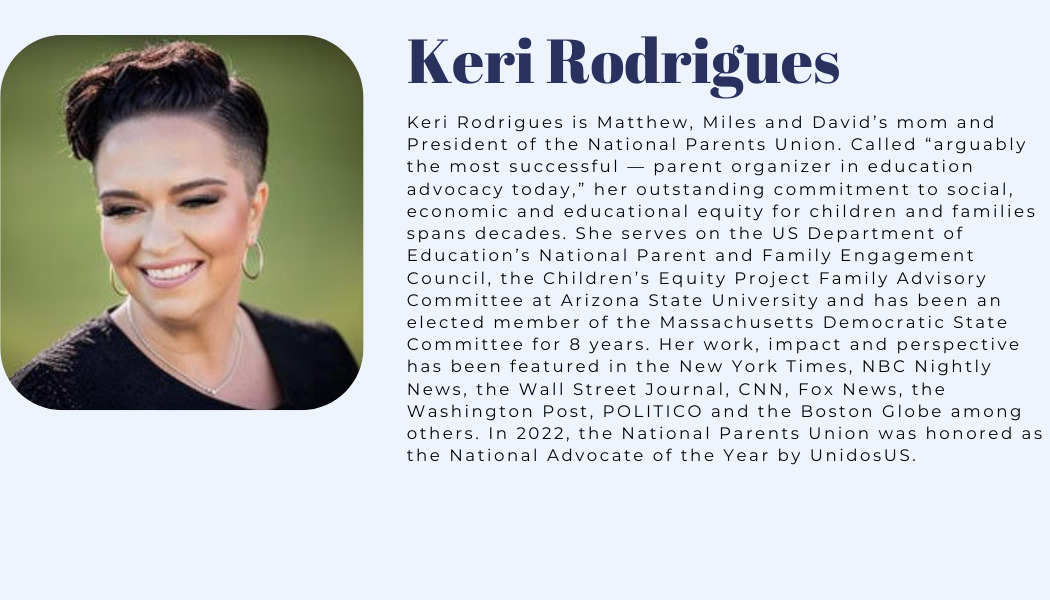
In the landmark Brown v. The Board of Education ruling, United States Supreme Court Chief Justice Warren wrote, “In these days, it is doubtful that any child may reasonably be expected to succeed in life if he is denied the opportunity of an education. Such an opportunity, where the state has undertaken to provide it, is a right which must be made available to all on equal terms.”
For many children across the United States, access to great educational opportunities is determined solely by their zip code and, in many districts, parents and family members have gone to jail for sending their child to a school outside that boundary. These arbitrary school boundaries often correspond to redlined real estate areas, originally created as a means to segregate neighborhoods based on race and limit access to economic opportunity to those already in a position of privilege. Providing equitable access to high quality education can be a down payment on the reparations owed to communities that have been historically underserved and have yet to experience restorative justice after centuries of systemic oppression.
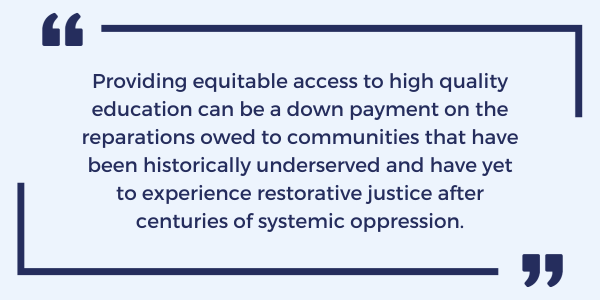
After listening to families across the country discuss their continued struggles to access great schools- the National Parents Union (NPU) developed key considerations for developing more accessible school choice programming. As outlined in NPU’s policy paper on school choice, as schools across the country contend with historic enrollment declines and an increased desire from parents to reinvent education, adopting statewide open enrollment policies to provide families with a clear picture of the educational options available to them, recognizing the importance of building new school models that prepare our children for economic mobility, providing parents with clear and transparent data to make informed choices, and ensuring that all public schools serve all students are priorities for NPU and our partners doing this work across the country.
Every child should have the right to enroll in any public school in their state, and be provided the resources and transportation to attend. Opening enrollment means opening opportunities to explore the avenue of learning that best fits their individual needs while fostering diversity, promoting equity and empowering parents and students. This approach to public education allows families to free themselves from the burden of being limited to an antiquated method of school assignment based on geographic limitation instead of by creating individualized pathways to success. Currently, 43 states permit open enrollment in some form, but only 11 of those states have mandatory open enrollment laws. However, due to district-level boundary policies, the majority of public school children do not have access to schools outside of their residential boundary assignment.
Providing families the flexibility to select an education environment that best aligns with the needs of their children – regardless of zip code and/or socioeconomic status – begins to level the playing field and guarantees equal access to high-quality educational opportunities for every student. Whether it’s the chance to attend a specialized school within a traditional district or the freedom for families to withdraw from underperforming schools and explore charter or virtual schools, open enrollment empowers parents to seek out individualized learning experiences for their children.
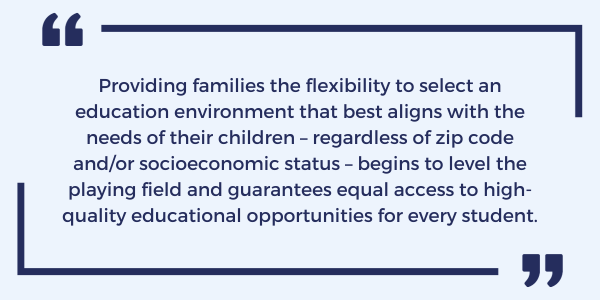
When a community is dissatisfied with the educational options available to their children, the creation and introduction of new public school models emerge as new opportunities that offer a multitude of benefits to students and families.
New school options offer families a broad range of options and provide the flexibility to design specialized curricula and utilize teaching methods that cultivate a more engaging and personalized learning experience.
In Denver, the introduction of new charter and innovation schools resulted in increased achievements for Black, Hispanic, English language learners, and Special Education students. Utilizing the common application in Denver Public Schools students have access to Science and Technology programs, International Baccalaureate programs, Dual Language models and Art programs, allowing them to customize their learning to focus on areas that interest them.
In Gwinnett County, Georgia, programs like the one at Seckinger High School, the nation’s first AI themed high school, gives students the opportunity to explore careers with a foundation in artificial intelligence that has seen skyrocketing rates of attendance and promising student assessment data. Seckinger is embracing the reimagination of education while disrupting traditional thinking around the role of this new technology and giving students a new pathway toward preparing for the jobs of the future.
Public school choice is a catalyst for school improvement and accountability, fostering healthy competition between districts, and encouraging schools to strive for excellence by continuously improving their educational offerings and exploring new innovations and technology. This not only compels struggling schools to make essential improvements to enhance their quality, but also serves as a driving force for innovation, and leads to investment in teacher development and enhanced curriculum quality.
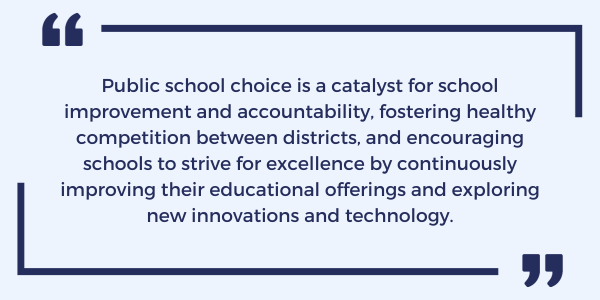
Charter schools operate under strict contracts that outline their performance expectations and goals. Failing to meet these standards can result in shut down, which ensures that taxpayer funds are used effectively instead of being allowed to fail generation after generation of our children and our communities. Accountability ensures that students are receiving high-quality education – something not guaranteed by traditional public schools that are allowed to remain open regardless of performance. As a result, students in both traditional and charter public schools benefit from an elevated standard of learning, and the overall quality of education in the community rises. Without this accountability, our system will continue to allow these schools to fail our communities over and over again, inflicting deep harm and trauma on our communities.
As a matter of justice, school systems must be held responsible for the quality of education they are providing to students and be required to allocate resources for remediation for students when they fall short. High-quality assessments allow us to better support these learners, providing parents with a clear and objective view of a school’s performance and actionable data to make decisions around intervention. Data also allows the community to assess which schools are excelling and which may need improvement, empowering families to make informed choices about their child’s education and take action to reform chronically struggling schools.
In the criminal justice setting, we do not expect racist police departments to understand the depth of their violence against the communities they have failed to serve without data and assessment – nor do we have any expectation that they will reform themselves without intervention, resources, training and guidance. We should hold our public education system to the same standard.
As school choice options continue to expand, it is essential to emphasize equity and accountability as the cornerstones of this evolving educational landscape. Prioritizing equity ensures that every student – regardless of background or socioeconomic status – has access to high-quality educational opportunities so we can work to bridge the achievement gap that continues to persist in our education system. School choice should not exacerbate existing disparities but instead should serve as a critical piece in promoting educational justice. The playing field must be leveled for the vulnerable and historically underserved populations, guaranteeing they have the same access and resources as their more privileged counterparts.
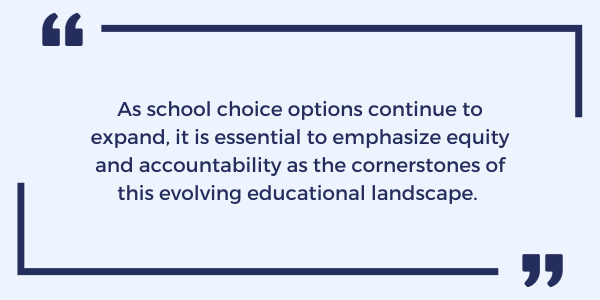
Accountability measures maintain the integrity of school choice programs, guaranteeing that public funds are spent efficiently and that all schools are held to high standards of performance. By combining school choice with strong accountability measures, education systems are created that offer options to parents that are of consistently high quality, while also providing protection from fraudulent and subpar schools entering the marketplace.
Open enrollment equals open opportunity. The National Parents Union supports embracing policies that include inter- and intra-district open enrollment. Allowing students to cross district and neighborhood boundaries encourages schools to create and promote more inclusive and culturally diverse environments. With global society becoming increasingly more diverse, exposure to a variety of backgrounds and perspectives not only enriches the learning experience for all students, but also better prepares them to participate in the world upon graduation.
When a commitment is made to create an inclusive school community, a powerful message is sent that all students are valued and welcomed, regardless of background, ability, or socioeconomic status. Giving parents and families the right to choose the school that best fits their child’s needs does not create inequities in our public education, but reveals where they have always existed and allows us to transform the system to create the change we need – where the system has failed to reform itself.